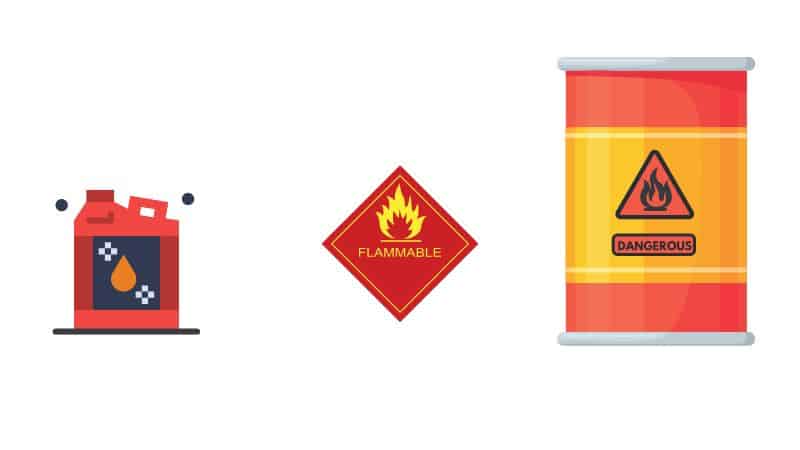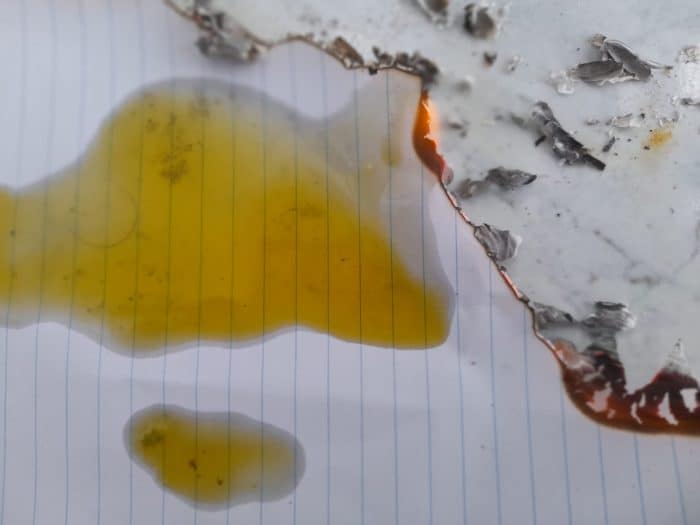Is Synthetic Oil flammable?
The answer is yes, synthetic oil is flammable in most cases. All oils are flammable to some degree. However, synthetic oil has a higher flash point than regular oil, meaning that it requires more heat to ignite.

While this may make synthetic oil seem safer, it’s still important to take precautions when handling and storing it. Be sure to keep it away from high temperatures and open flames, and dispose of it properly when you’re finished using it.
Remember, even though synthetic oil may be less flammable than regular oil, it can still pose a serious fire hazard. Always use caution and follow the manufacturer’s instructions when handling and storing synthetic oil.
Why Synthetic Oil is Flammable?
Synthetic oil is made from a variety of hydrocarbons. These hydrocarbons are combined to create a product that has a higher flash point than regular oil. The flash point is the temperature at which a substance ignites and begins to burn. While synthetic oil may have a higher flash point than regular oil, it’s still flammable. Actually, any oil can be dangerous if it’s not handled properly.
Does synthetic oil burn in a fire?
Yes, Synthetic oil burns in a fire, but it needs higher temperature & heat. Generally, Synthetic oils have a high flash point of 400-500 degrees F, which is quite higher than mineral or conventional oil. So synthetic oil needs a high temperature to burn in a fire.
Are all oils flammable?
Oil is flammable because it contains hydrocarbons. Hydrocarbons are molecules that contain both hydrogen and carbon atoms. when these molecules are heated, they can ignite and cause a fire.
So, even though synthetic oil may have a higher flash point than regular oil, it’s still flammable and should be handled with care.
Is all Car Oil Flammable?
The answer is no, all car oil is not flammable. Some car oils are specifically designed to be non-flammable. These oils are typically used in applications where there is a risk of fire, such as in racing engines.
Non-flammable car oils typically have a higher flash point than regular car oils. This means that they can withstand higher temperatures before igniting.
If you’re looking for non-flammable car oil, be sure to check the product labels and specifications to make sure that it meets your needs. Specially check car engine oil flash point.

Synthetic Oil Change
Synthetic oil is a type of motor oil that is designed to last longer and protect your engine better than conventional motor oils. Synthetic oil is typically made from a blend of synthetic and natural ingredients. The exact composition of synthetic oil varies depending on the manufacturer. Most synthetic oils are designed to be compatible with all types of engines, including those with high mileage. Synthetic oils typically have a higher price tag than conventional motor oils. However, they can often save you money in the long run by extending the life of your engine and reducing wear and tear. If you’re considering switching to synthetic oil, be sure to consult your owner’s manual or the manufacturer of your vehicle to determine the best oil for your needs.
Why does Synthetic Oil give Long intervals?
Synthetic motor oil is designed to last longer and protect your engine better than conventional motor oils. Synthetic oil is typically made from a blend of synthetic and natural ingredients. The exact composition of synthetic oil varies depending on the manufacturer. Most synthetic oils are designed to be compatible with all types of engines, including those with high mileage. Synthetic oils typically have a higher price tag than conventional motor oils. However, they can often save you money in the long run by extending the life of your engine and reducing wear and tear. If you’re considering switching to synthetic oil, be sure to consult your owner’s manual or the manufacturer of your
How often is synthetic oil change:
For most synthetic oils, it is recommended that you change your oil every 5,000 to 7,500 miles. However, always check your owner’s manual or the manufacturer of your vehicle to be sure. Thanks for choosing JustAnswer! synthetic oil is frequently used in automobile engines and other machinery because it generally outperforms traditional mineral-based lubricants.
Synthetic oil is usually based on chemical compounds such as polyalphaolefins (PAO) or synthetic esters. These oils provide better protection for engine parts than conventional motor oils, and they can also help extend the life of your engine. However, synthetic oils are not without their drawbacks. One downside is that they can be more expensive than traditional motor oils. Another potential downside is that they are more flammable than mineral-based oils.
While most synthetic oils have a higher flash point than mineral-based oils (the temperature at which the oil ignites), they are still flammable. If you are concerned about the flammability of synthetic oil, you should check with the manufacturer of your vehicle to be sure.
How much is synthetic oil change price:
The cost of a synthetic oil change can vary depending on the type of vehicle you have and the specific synthetic oil you use. However, you can expect to pay anywhere from $30 to $80 for a synthetic oil change. If you are interested in using synthetic oil in your vehicle, be sure to do your research to find the best product for your needs. You should also consult with a qualified automotive technician to be sure that it is the right choice for your vehicle.
Final Words:
While many people believe that synthetic oils are better for their vehicles, it is important to remember that they are still flammable. If you have any concerns about using synthetic oil in your vehicle, be sure to check with the manufacturer first. Thanks for choosing Just Answer!
Read Also: Semi-Synthetic Engine Oil VS Fully Synthetic
